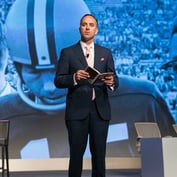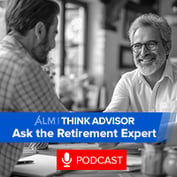Thirty years ago, when Ron Cordes got his start in the financial services industry, he had similar goals to most people in that line of business — to serve people, help them build nest eggs for their retirement and make a little money for himself along the way.
In reviewing his career path, Cordes did alright by himself. But as much as he enjoyed the work and enjoyed working with clients, something was nagging at him.
“In my 40s,” Cordes tells me, “I decided at 50 I wanted to re-pivot and set up a foundation to focus on global poverty.”
Cordes, you see, is among a growing number of baby boomers who are finding (to turn a famous F. Scott Fitzgerald quote on its head) that there are second acts in American lives.
Over the years Cordes had grown his business, AssetMark Investment Services, and eventually sold it to Genworth Financial in 2006. As part of the deal he was kept on in a strategic role at Genworth where he is co-chairman of Genworth Financial Wealth Management, Inc., which holds more than $24 billion of assets under management.
But the majority of his time, he says, is spent with his family foundation, Cordes Foundation, and as a pro bono evangelist for helping retirement-age people find fulfilling work in their second careers.
His personal mission, he says, “is to be a leading global voice to give people a conscience.” He knew early on that working toward ending global poverty was his calling, but he also knew that many people who are socially conscious and in his shoes financially don’t know where, exactly, to put their money or their efforts.
“What I want to do is help build the infrastructure and make the connections so it will make it easier for people to move forward.”
The boomers
According to Cordes, the baby boomer generation is in the perfect position to handle this idea of the socially conscious second career. As a boomer, Cordes knows what makes the generation tick. He knows, going back to their rebellious and turbulent decades of the ‘60s and ‘70s that they want to see change take place. And, from their position of nearing what we’ve previously defined as retirement age, they’re able to shape the landscape the way they have throughout their lives.
“The boomer generation has moved through their lifecycle redefining every stage of life as we know it,” Cordes says. “I assume that they will redefine retirement as well in a world where ‘retirement’ could now be decades and decades long.”
When Cordes did his soul searching in his 40s, he looked at “50 as halftime.” He understands that some people want their golf courses and their RVs and their circumnavigation of the globe as retirement.
“Yes, that’s a good time in your life for six or nine months,” he says.” But eventually you have to get on with life. It’s almost impossible to look at that as a way of life for 30 years.”
The platform
In recent years, Cordes has become something of a poster boy and an evangelist for Encore.org, a nonprofit organization that promotes second acts for the greater good. He serves on the organization’s board of directors and speaks at events such as the Milken Institute Global Conference, where he can proselytize about making the most of your second career.
Marc Freedman, the organization’s founder and CEO, says “everything is shifting dramatically,” regarding people and their retirement. Freedman is fascinated by how the stages of life are under revision these days. “People are more aware of greater longevity. We are now in an era where half of the kids born since 2002 will see 100.”
With so many people living so much longer it’s inevitable to Freedman that “retirement-age” people take a hard look at what they can do with their lives — and what better way than in giving back?
Perhaps the best way to describe the impetus and the drive behind Encore is found in science fiction writer William Gibson’s quote, “the future is already here; it’s just not evenly distributed.”
What about the little guy?
Freedman says retirement is no longer a cutoff. It’s a place where people embrace work that is more meaningful to them.
He says that, from a psychological point, mortality becomes real to you. “You know you’re going to die. You begin to realize this more concretely. You develop questions of ‘If I’m going to work longer, what kind of work am I going to do?’ You realize you might have another 20 good years. So you better getting going.”








 April 17, 2013 at 08:00 AM
April 17, 2013 at 08:00 AM









